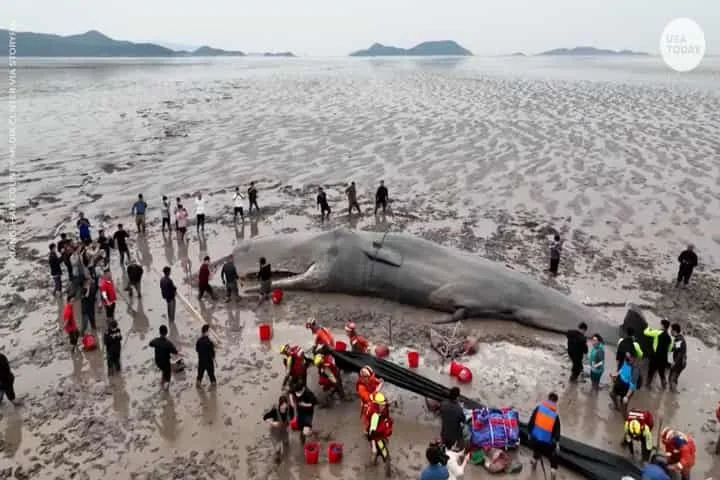

Volunteers ensured that the sperm whale was kept cool by continuously pouring water over it
<p>
<strong>It was a joyous occasion for conservationists and champions of marine life as a large sperm whale stranded near China&rsquo;s Ningbo, was rescued after an arduous 20-hour operation and towed back to sea last week, said a report in livescience.com.</strong></p>
<p>
As to what lies ahead for this mammal (Physeter macrocephalus) is difficult to predict since those creatures which have been beached don&rsquo;t necessarily make it even when rescued observed Bruce Mate, who is a Professor Emeritus in Fisheries, Wildlife and Conservation and earlier director of the Marine Mammal Institute at Oregon State University&#39;s Hatfield Marine Science Center.</p>
<p>
<iframe allow="accelerometer; autoplay; clipboard-write; encrypted-media; gyroscope; picture-in-picture" allowfullscreen="" frameborder="0" height="315" src="https://www.youtube.com/embed/dXkODXhITho" title="YouTube video player" width="560"></iframe></p>
<p>
Talking to Live Science, Mate said: <a href="https://www.livescience.com/beached-sperm-whale?utm_source=SmartBrief&amp;utm_medium=email&amp;utm_campaign=368B3745-DDE0-4A69-A2E8-62503D85375D&amp;utm_content=979A4AFB-E050-4374-B605-6691B6E932FF&amp;utm_term=c2029947-e980-4274-bc11-2f4c117930b6">&quot;Good on them for making a noble</a> effort in trying to get this animal back to sea, but the odds are quite difficult.&rdquo;</p>
<p>
On April 19, this creature was discovered struggling in the shallow waters and with the tide going out, this 62-foot-long mammal was left lying on a mudflat. It faced the grave risk of dehydration or choking under its own weight. Heat is extremely dangerous for them, said Mate. As deep-sea predators, these animals look for prey 1.6 kilometres below the surface of the oceans in the ice-cold waters and temperature in Ningo was touching 19 degrees Celsius.</p>
<p>
Even though it was not hot, it was enough to adversely affect the sperm whale. Explaining this, Mate said: &quot;Blubber keeps internal body heat in and leads to overheating if the whale cannot get rid of the heat another way. Getting rid of body heat is done [in] a variety of ways, including water contact with the skin, especially at thin structures, like flukes and flippers, and very vascular areas, like the tongue. It is not possible for the whale to do this when it is out of the water.&quot;</p>
<p>
There was a rescue attempt by authorities using five boats yet this did not materialise as the whale was too big and so volunteers kept the animal cool with water waiting for the tide to rise. With the water level rising, a tugboat was used to pull the whale into the ocean and when the ropes towing the mammal were cut, it started swimming on its own.</p>
<p>
According to experts, going by the size of the whale it was in all probability a male which was good since in case it was a female or a juvenile, both live in pods, it would have cried for help bringing in the group often resulting in mass death. Mate referred to the stranding of 43 sperm whales in the 1970s along the Oregon coast in which not one survived. In contrast, adult males live alone and thus the Ningbo one was also an adult limiting the casualty.</p>
<p>
<strong>Also read: <a href="https://www.indianarrative.com/science-news/first-recorded-brain-infection-detected-in-rare-greenland-shark-164543.html">First recorded brain infection detected in rare Greenland shark</a></strong></p>
<p>
The grounding may be caused due to varied reasons. There could be something wrong with the animal. Mate and others rescued a distressed calf and took it to the oceanarium for care. It did not survive and it was found that it suffered from a twisted gut which choked the supply of blood leading to shock.</p>
<p>
Stranding itself may cause harm to the creature as organs may get damaged beyond repair as its body was not created for land. &quot;What happens for these animals is, their individual organs start the process of dying, but the whole animal doesn&#39;t die until days later,&quot; remarked Mate.</p>
<p>
There have been cases when these giants have got lost or made an error and got stuck in the shallow water or beaches.</p>
<p>
The chances of this rescued whale being sighted again are remote as these animals travel far and wide.</p>
Prime Minister Narendra Modi on Tuesday held a telephonic conversation with Union Home Minister Amit…
Prime Minister Narendra Modi landed in Jeddah on Tuesday for a two-day State visit to…
Lauding the "deep connection" between the United States and India, US Vice President JD Vance…
Indian Minister of Power and Housing Affairs, Manohar Lal Khattar, visited the Arun-III Hydel Project,…
The body of the late Pope Francis will be transferred to St. Peter's Basilica on…
The case of Baloch human rights activist Dr Mahrang Baloch has been officially accepted for…